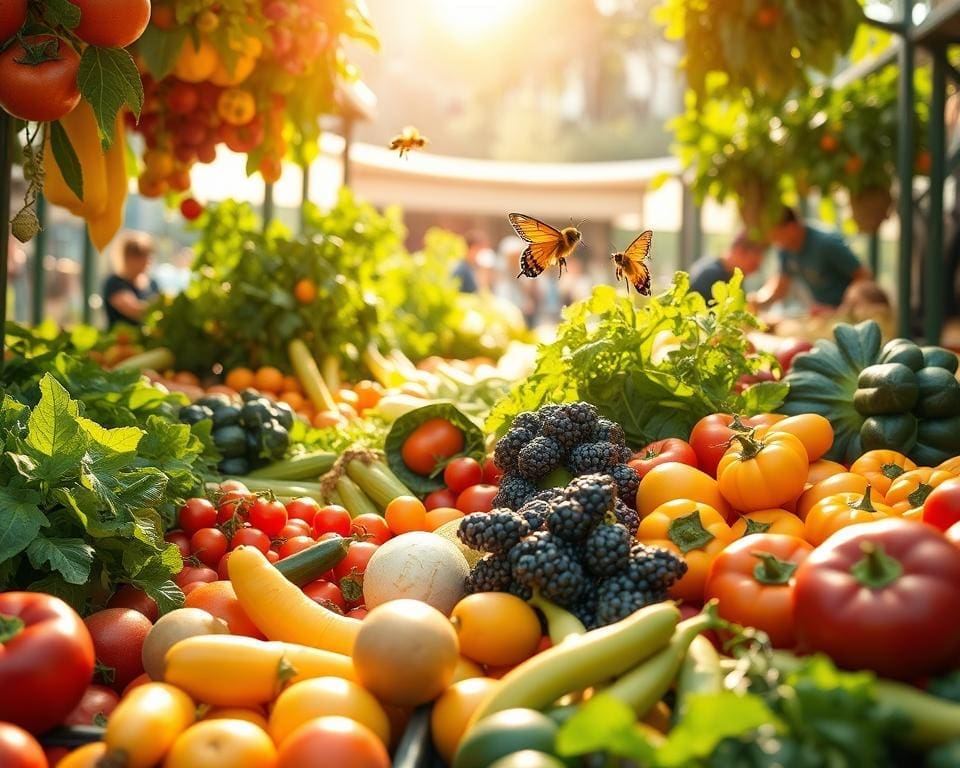The conscious shift towards organic food is not just a trend but a vital investment in both personal health and the environment. As consumers become increasingly aware of the benefits of organic produce, they are making informed choices that resonate with sustainable farming practices. This commitment supports an ecosystem that prioritises biodiversity while simultaneously reducing pollution levels.
According to the Soil Association, embracing organic farming principles fosters a healthier environment across the UK. Meanwhile, the Organic Trade Association highlights a significant rise in consumer demand for organic products, indicating that more individuals are prioritising health and sustainability in their daily lives. Investing in organic food is not merely about purchasing healthier options; it signifies a broader commitment to nurturing our planet.
Understanding Organic Food and Its Benefits
Organic food refers to products cultivated through methods that prioritise ecological balance. By adhering to strict regulations and standards, organic practices prohibit synthetic pesticides and genetically modified organisms (GMOs). The UK’s Department for Environment, Food & Rural Affairs highlights organic farming as a method that seeks to promote environmental sustainability.
What Is Organic Food?
Organic food is produced under specific guidelines that foster biodiversity and soil health. This approach not only enhances the flavour of food but also ensures that consumers enjoy a wide array of health benefits. Organic farmers utilise natural resources and sustainable farming techniques, contributing positively to the environment and local ecosystems.
Differentiating Organic from Conventional Foods
Distinguishing organic from conventional foods illuminates significant differences in farming practices. Conventional foods often involve synthetic chemicals and pesticides, potentially resulting in residue that remains on the final product. In contrast, organic foods prioritise natural inputs, which leads to cleaner produce. Awareness of these differences empowers consumers to make healthier dietary choices.
The Nutrient-Rich Profile of Organic Produce
Research indicates that organic produce frequently possesses a nutrient-rich profile compared to its conventional counterparts. Studies published in the British Journal of Nutrition reveal that organic fruits and vegetables often contain higher levels of antioxidants and essential vitamins. These nutritional advantages make organic foods a compelling option for health-conscious individuals.

Organic Food: Why It’s Worth the Investment
Investing in organic food presents numerous advantages that extend beyond mere taste. The potential health benefits associated with organic produce are substantial, influencing both personal well-being and long-term financial savings.
Health Benefits of Organic Food
Organic food often has a richer nutrient profile compared to its conventional counterparts. Research indicates that these foods can offer reduced exposure to harmful pesticides and chemicals. Enjoying organic produce not only promotes better physical health but also supports mental clarity and overall vitality. Consumers frequently report feeling more energised and healthier when integrating organic options into their diets.
Long-Term Savings on Health Care Costs
Investing in organic foods can translate into significant long-term savings. Healthier individuals typically require fewer medical interventions and experience reduced healthcare expenditures over time. Maintaining a diet rich in organic produce may prevent a variety of diet-related illnesses, such as obesity and diabetes. This proactive approach to health shines a light on how choosing organic food is as much a financial investment as it is a health investment, leading to sustainable living.
Sustainable Farming Practices in Organic Agriculture
As the world shifts towards more eco-friendly practices, organic agriculture emerges as a beacon of hope for sustainability. Emphasising sustainable farming techniques not only safeguards our environment but also enhances the quality and resilience of the agricultural ecosystem. By understanding how these practices work, consumers can appreciate the significant investment they make in both their health and the planet.
How Organic Farming Protects the Environment
Organic farming utilises a variety of methods aimed at preserving and enriching the environment. Techniques such as crop rotation, soil fertility management, and enhancing biodiversity are integral to reducing harmful environmental impact. The Food and Agriculture Organisation highlights that organic practices can sequester carbon in the soil, helping mitigate climate change. This commitment to sustainability enhances soil health and increases resilience against pests and diseases, further contributing to a thriving ecosystem.
Supporting Local Produce through Organic Sourcing
By choosing organic produce, consumers are not only investing in their health but also supporting local economies. Sourcing local produce from organic farmers strengthens community ties and diminishes the carbon footprint associated with transportation. This fosters a sense of community and promotes the importance of investing in sustainable practices that benefit both the consumer and the environment. By prioritising organic sourcing, individuals can make conscious decisions that resonate deeply with broader sustainability goals.









